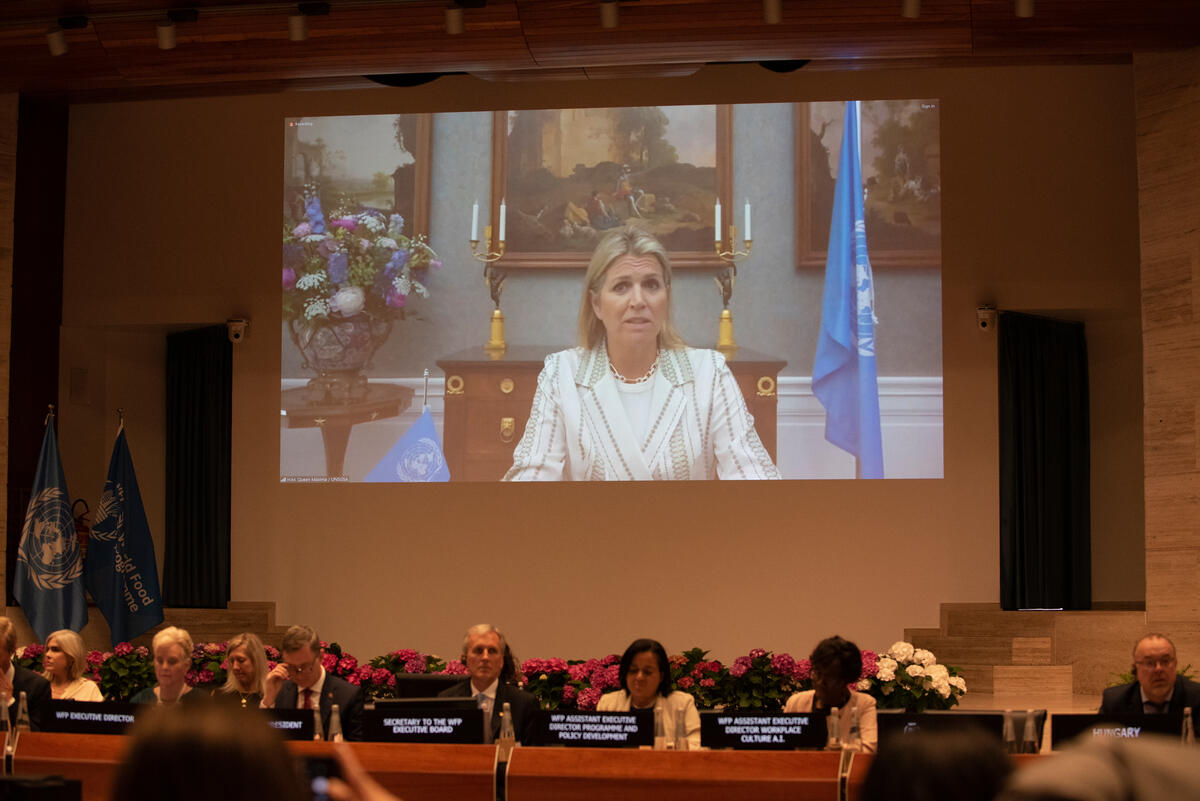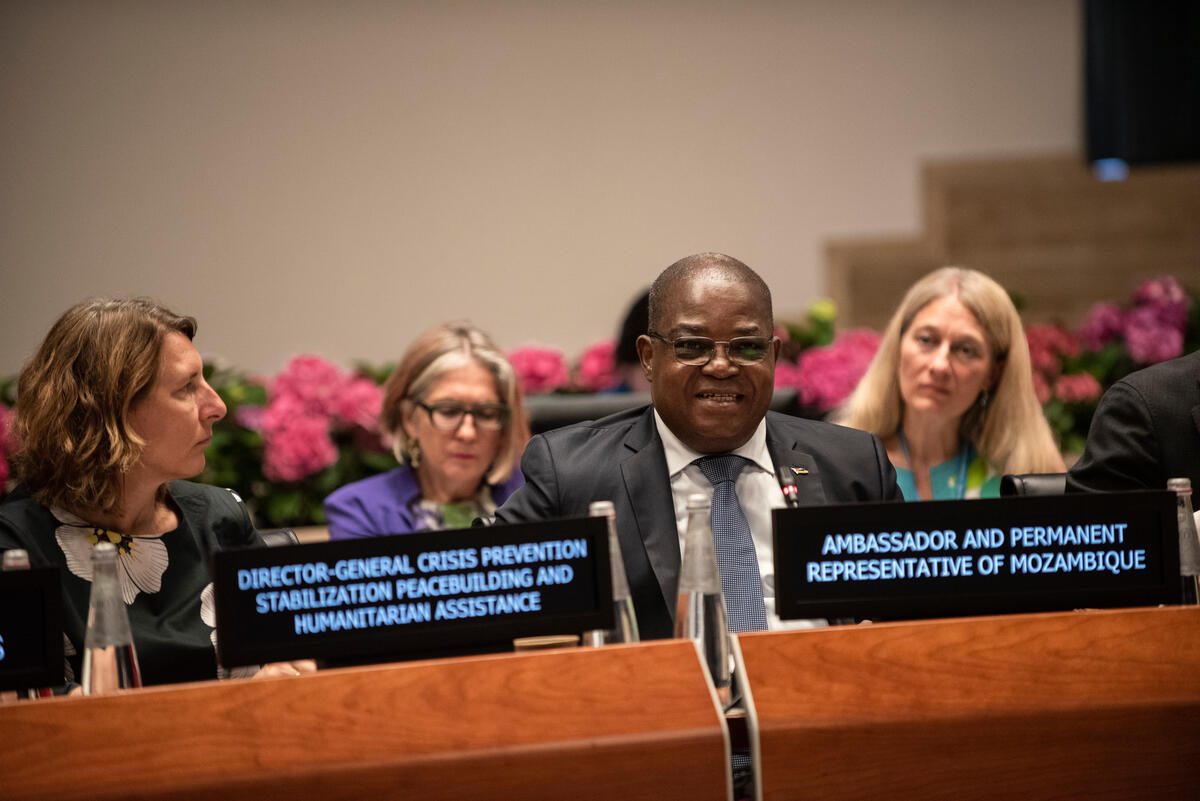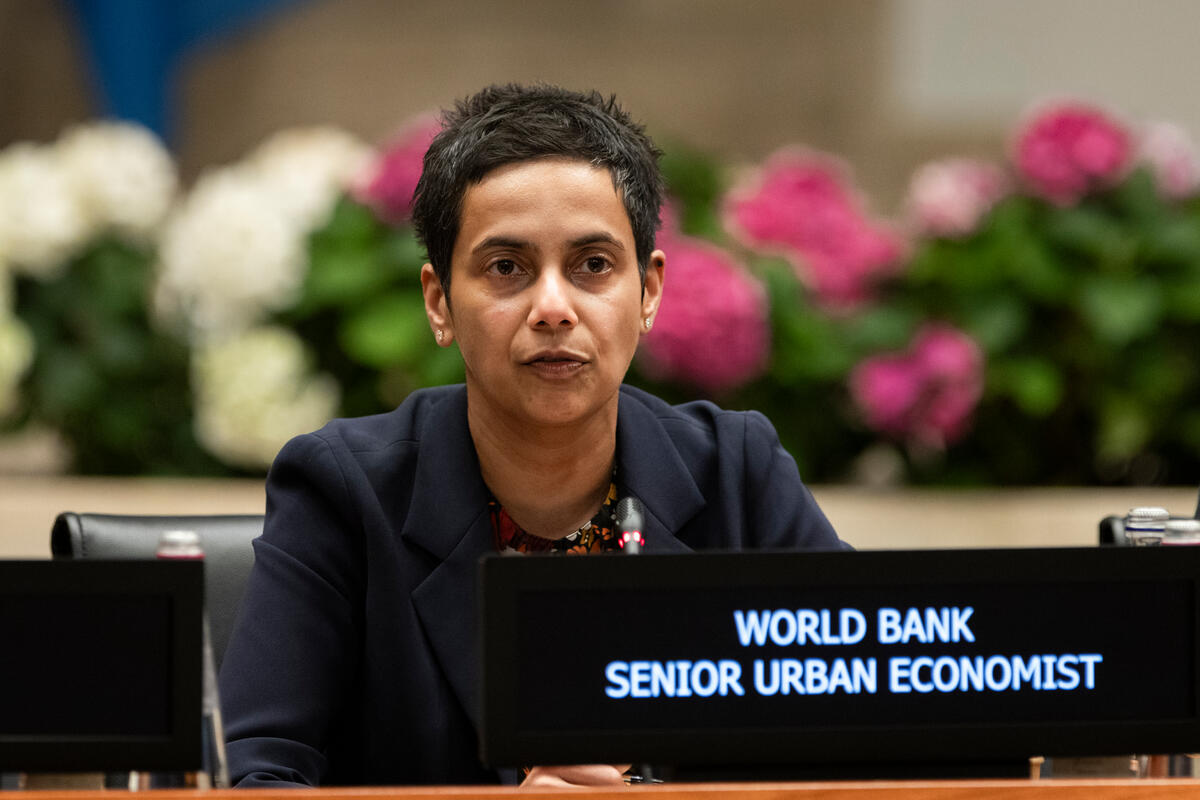Rome headquarters hosted the 2023 Annual Session of the Executive Board for four and a half days from 26- 30 June 2023. During this successful session, 51 documents were presented for approval, consideration, or information. The session also featured several side events, exhibits and a special address by Her Majesty Queen Máxima of the Netherlands and UN Secretary-General's Special Advocate for Inclusive Finance for Development on occasion of the Board’s review of the WFP Cash policy.

Opening remarks by WFP Executive Director Cindy McCain
In her first Board session as WFP Executive Director, Cindy McCain warmly welcomed the members and expressed her gratitude for the support and encouragement she received since the beginning of her tenure in April 2023.
The ED noted that, despite the exceptional levels of funding the World Food Programme has received in the recent years, the gap between funding and humanitarian needs has widened due to new conflicts, such as those in Ukraine and Sudan, pandemic aftershocks, economic crisis and climate extremes. While WFP’s current 2023 operational requirements have risen to USD 25.1 billion, donor contributions for this year are forecasted to drop to USD 10 billion. McCain provided some detailed figures: the number of people facing high level food insecurity has increased to 345 million. 40 million people are severely food insecure, and 45 million children are acutely malnourished. Worst of all, nearly 130,000 people are teetering on the brink of famine in Burkina Faso, Mali, Somalia and South Sudan.
The ED recounted her visit to a camp for internally displaced people in Dolow, Somalia where she spoke with mothers who had fled from remote villages with their families to protect their sons from armed groups recruiting them by force and killing those who refused.
Because of the resourcing gap, WFP has been forced to reduce food rations and cut cash payments to millions of beneficiaries around the world, including Afghanistan, Yemen, Syria, Bangladesh, Haiti, Mali, Niger and Palestine, added McCain.
The WFP’s Executive Director then presented the three-pronged action plan to address the current funding shortfall: “First, we must expand WFP’s resources base. Second, we must sharpen our focus rigorously, prioritizing programmes and initiatives and boosting efficiency and effectiveness. And third, we must scale up partnerships to deliver solutions, tackling the root cause of hunger”.
On this last point, the ED appealed for government donors to step up and remarked that WFP is working to prioritize relationships with international and regional financial institutions while expanding partnerships with the private sector. “We have to be a lot more ambitious and partner with cutting-edge companies that can help us develop with smart innovations that will help build resilience and reduce hunger” said the ED referring to early warning systems and solutions for climate prediction enabling vulnerable communities to cope with climate shocks (e.g. floods, droughts and storms). Closer collaboration with existing partners, especially the other Rome-based agencies and UN agencies is also crucial, as said by McCain.
The new Executive Director also commended the WFP global staff for its incredible lifesaving work which she has recently seen first-hand in Haiti and Dominican Republic. The ED then took a moment to remember the three staff members who lost their lives during the onset of the Sudan conflict in April and expressed her condolences to their families.
“Our people are determined to serve our beneficiaries and in return I am determined to give them the resources they need to hold back the rising tide of hunger. The field must always come first. This means sharpening our focus as an organization, being more efficient and, to be frank, tightening our belts” McCain said.
Among the WFP’s priorities, workplace culture is key also for the ED. As she said, “the organization has made good progress in gender parity, but we have more to do on anti-racism, disability inclusion and LGBTIQ+ issues”, and stressed the importance of WFP leaders demonstrating commitment to equality through behaviour.
“This is what I offer you today and you have my personal commitment to openness and honesty and the highest standards of transparency and accountability as I lead WFP forward. I am confident that together we can and we will succeed in transforming the lives of millions of the world’s most vulnerable people, not just giving them food for today but hope and opportunity for a better tomorrow”, concluded the Executive Director.

Special address by Her Majesty Queen Máxima of the Netherlands
Her Majesty Queen Máxima of the Netherlands attended this EB Annual Session in her role as the United Nations Secretary-General’s Special Advocate for Inclusive Finance for Development. HM delivered an online special address with a particular focus on advancing universal access to responsible use of affordable, effective and safe financial services.
Queen Máxima remarked that financial inclusion is an effective tool enabling to meet the basics needs of people caught in humanitarian crisis, such as food, water, health care or shelter, and have a better chance of finding a way out of crisis.
Her Majesty provided some examples: remittances transferred to rural households in Mozambique after floods meant they could obtain food, water and medicine until the waters receded. People displaced by civil war in Burundi were less likely to remain trapped in poverty when participating in a community savings group, avoiding selling off their lands or sending their children into the workforce. In Niger depositing social transfers into a women's mobile money accounts gives them greater power and freedom to make their spending decisions.
HM Queen Máxima congratulated WFP for the Cash policy discussed and approved later in the afternoon, defining it a milestone in financial inclusion. She explained that more than 75 percent of people in crisis do not have access to the formal financial system, and this new policy is a tool to close this gap. Indeed, through mobile money WFP can quickly and safely transfer resources to people in crisis enabling them to purchase food and find shelter. This modality also provides recipients the flexibility to choose how and when to spend their money, giving them the option to save small sums for the future. In addition, it is a way to inject cash into local economies.
Some of the next step could be providing access to the formal financial system to people who are not citizens, as well as promotion of digital IDs and the development of interoperable payment system, among the other improvements, as said by Her Majesty.
It is also necessary to ensure the responsible use of digital technology by monitoring risks, preventing fraud and building financial knowledge and capabilities, warned Queen Máxima.
Finally, Queen Maxima of the Netherlands concluded her speech by suggesting designing programmes that place women at the centre of every solution as they are 10 percent more likely than men to need help using financial services.

Key documents
Among the key documents of this session:
- Cash Policy, which describes how WFP will use the cash transfer programmes to achieve greater impact for more people while mitigating and preventing potential risks in both development and humanitarian contexts. This policy updates the WFP’s first policy on cash and vouchers approved in 2008. Since then, the WFP’s capabilities and knowledge of how to deliver cash have grown and now cash-based transfers constitute 35 percent of all WFP assistance, making WFP the world’s largest provider of humanitarian cash.
- South–South and triangular cooperation policy update revises the WFP’s existing South-South and triangular cooperation (SSTC) policy approved in 2015 as a vital tool for empowering the Global South to achieve a more stable, prosperous future. This update focuses on three strategic areas: consolidating WFP’s established SSTC offer, responding to emerging areas of demand for SSTC support and ensuring quality and results.
- Annual performance report for 2022, which provides a complete overview of WFP's results in 2022. This shows that in 2022 WFP scaled up its operations and provided lifesaving and life-changing assistance to 160 million people globally. A record number of beneficiaries representing 25 percent more than the previous year. Given the unparalleled needs, in 2022 WFP contributions reached a record level of USD 14.1 billion.
- Pacific multi-country strategic plan covering 14 countries and territories in the Pacific region experiencing increasingly frequent and more severe extreme weather events, with disproportionally high economic, social, and environmental consequences. Through this multi-country strategic plan WFP aims at leveraging core strengths in logistics, emergency telecommunications, food security and disaster risk management. Priority is on strengthening national and regional capacities to anticipate, prepare for and respond to disasters by underpinning national initiatives and supporting them to address gaps in food security and nutrition, particularly focusing on those most at risk of being left behind.
- Country Strategic Plans for Egypt (approved at the total cost for WFP of USD 431,312,019), Kenya (USD 1,433,999,462) and Zambia (USD 98,463,341).
Click here to review all the documentation and here to read all decisions and recommendations.

Side events and Exhibits
The EB Members and other visitors were offered the opportunity to attend two side events and two exhibits.
The Immediate Response Account: Kick-starting an emergency response
In the afternoon of Tuesday, 27 June, the Government of Germany and Switzerland, in cooperation with the WFP’s Emergency Operations Division, delved into an engaging discussion on the allocation process for “last resort” funding from the Immediate Response Account (IRA) within 72 hours of a sudden onset emergency for life-saving activities, and discussed the impact of immediately available flexible funding.
Mr. Carl Skau, WFP Deputy Executive Director and Chief Operating Officer, introduced the discussion explaining the importance of IRA funds to avert famine and acute food insecurity in key operations. The discussion was facilitated by Mr. Yves Guinard, PhD, Counsellor, Alternate Permanent Representative of the Permanent Mission of Switzerland and deepened with donors’ insight. Among the others, there were H.E. Santos Álvaro, Ambassador and Permanent Representative of Mozambique to the United Nations Organizations in Rome, Ms. Deike Potzel, Director-General for Crisis Prevention, Stabilization, Peacebuilding and Humanitarian Assistance of the German Federal Foreign Office and H. E. Nicole Ruder, Ambassador and Vice-Director of the Swiss Agency for Development and Cooperation.
To complement the side event, an exhibition was installed in the Red Lifts Foyer. Through photos, text and interactive displays, this exhibit showcased the impact of Immediate Response Account (IRA) to provide life-saving assistance at the onset of emergencies and raised awareness on the critically low levels of IRA funding.

Launching the WFP Urban Strategy. A framework for action to achieve zero hunger in an urbanizing world
On Thursday, 29 June, the WFP officially launched its first-ever Urban Strategy. Ms. Valerie Guarnieri, Assistant Executive Director, Programme and Policy Development Department, presented the new strategy as a framework for action for achieving zero hunger in an urbanizing word.
Keynote speaker Dr. Stephen Devereux, Global Expert and Research Fellow from the Institute of Development Studies of the University of Sussex, who joined the event online, provided evidence on how urbanization impacts food security and nutrition outcomes and what this means for WFP’s mandate and programming.
Mr. Samir Wanmali, Deputy Director of Programme – Humanitarian and Development Division, moderated a round table’s discussion with a panel composed by Ms. Franscesca Erdelmann, country director of WFP Zimbabwe, Mr. Jean-Martin Bauer, country director of WFP Haiti, Ms. Megha Mukim, Senior Urban Economist of The World Bank, and Mr. Guido Santini, Programme Coordinator, Food for the Cities of FAO. The speakers provided concrete examples of the added value of WFP programmes in urban areas and reflected on the role of partnerships and a system-wide approach in addressing food security and nutrition challenges emerging from rapid urbanization.

Her Money. Her Account. Her Future. An exhibition on the power of cash transfers
On the occasion of the Board’s review of the Cash Policy, the Cash-based Transfers Division set up an art exhibit on the Red Cafe’ Foyer. The exhibition featured a collection of stories and photographs of women who had been affected by crises worldwide and whose life has been changed by the WFP’s cash programmes. Among the others, the exhibit showed the story of Therese who received assistance in an IDPs camp in Central African Republic and used it to care for her twins. EB representatives and other visitors were also shown the pictures of Kisimba who used part of her cash assistance to rebuild her house and start farming after conflict in the Democratic Republic of Congo.
Further information regarding side events and exhibits is available here, under the “Side Events and Exhibitions” tab.



































































































































